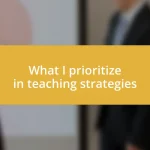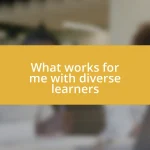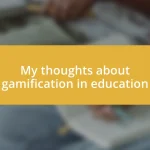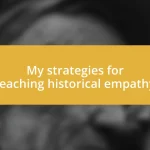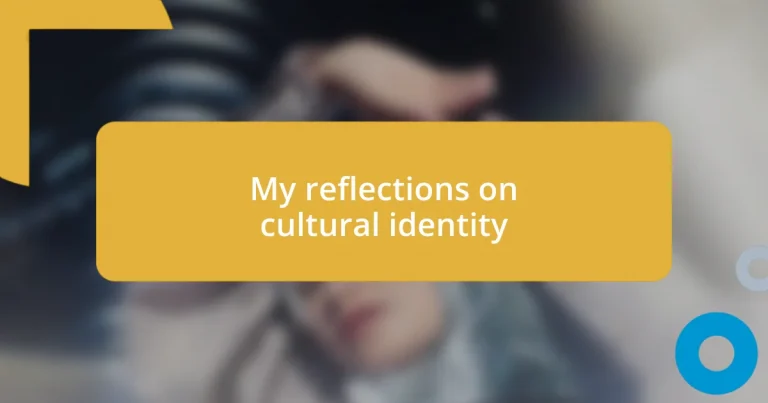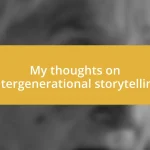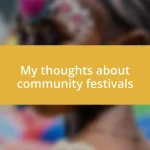Key takeaways:
- Understanding cultural identity involves personal experiences, heritage, and the connections formed through shared traditions and stories.
- Navigating dual cultural identities often presents both challenges and opportunities for growth, fostering resilience and empathy.
- Building cultural awareness through sharing narratives and participating in community events enhances understanding and appreciation of diverse perspectives.
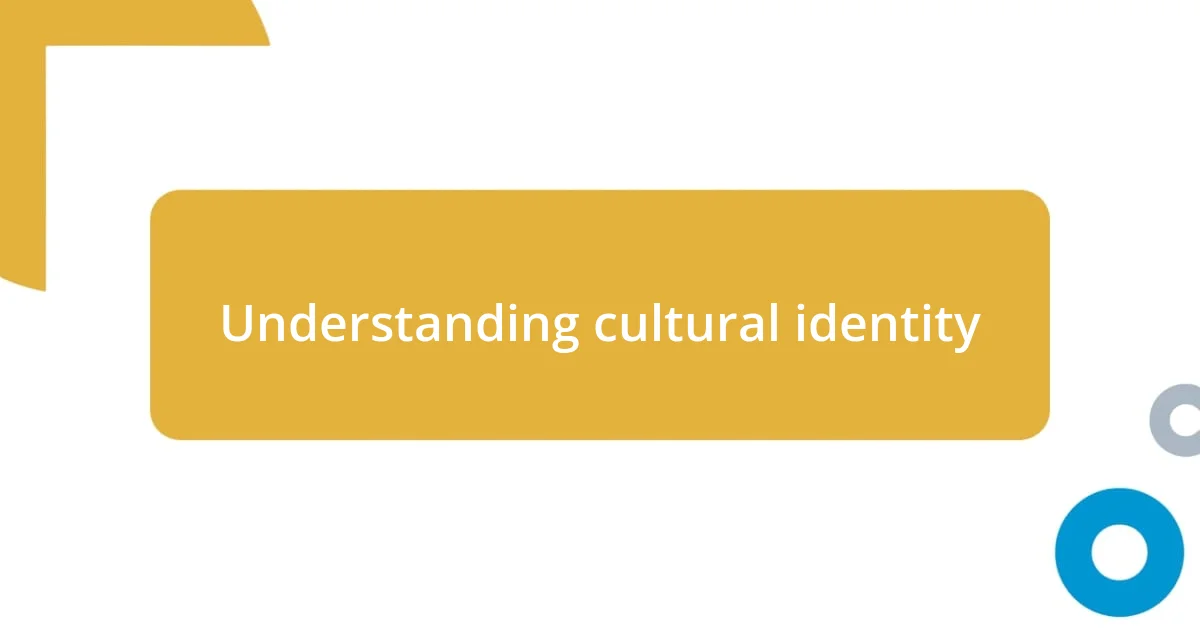
Understanding cultural identity
Understanding cultural identity is a deeply personal journey that shapes who we are. I remember when I attended a local festival celebrating my heritage; the sights, sounds, and scents wrapped around me like a familiar blanket. In that moment, I felt a profound connection—not just to my roots, but to the shared experiences of my community. Have you ever felt that rush of belonging when immersed in your culture?
Cultural identity isn’t just about traditions or customs; it’s also woven into our values and beliefs. For instance, I’ve often found myself reflecting on my family’s emphasis on storytelling. It’s fascinating how these narratives have influenced my perspective and shaped my understanding of the world. Doesn’t it make you think about how the stories you carry with you define your identity?
Moreover, exploring cultural identity invites us to confront our differences and find common ground. I vividly recall a conversation with a friend from a different background, where we discovered shared values despite our contrasting experiences. That exchange opened my eyes to the richness of diversity—how can we fully appreciate ourselves without understanding others?
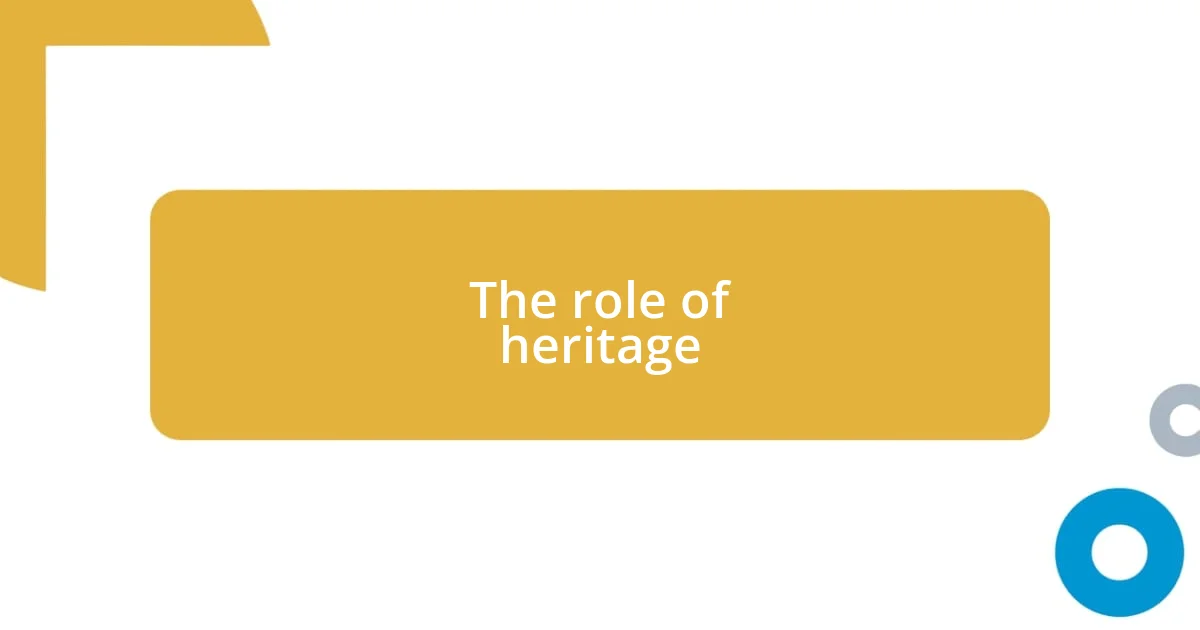
The role of heritage
Heritage acts as a bridge connecting us to our past, providing a sense of continuity in an ever-changing world. I vividly remember sifting through my grandmother’s old photo albums, the faded images depicting a world I had never known. Each photograph sparked a story, a legacy passed down through generations, reminding me that my life is intricately tied to those who came before me. Have you ever delved into your family’s past and felt a similar awakening?
The languages we speak often carry our heritage’s essence, shaping our identities in profound ways. I sometimes catch myself using idioms from my native tongue—expressions that can’t be perfectly translated but are rich with meaning. This practice not only honors my ancestry but also enriches my interactions with others, reminding me of the beauty found in the nuances of language. How do the words you use connect you with your heritage?
When I think of the traditions my family upheld, like our annual holiday celebrations, I feel a deep gratitude for the rituals that ground us. Each year, we gather around a table filled with dishes that tell stories of our ancestors’ journeys. As we share these meals, it becomes clear that heritage is not just a background—it’s the fabric of our daily lives, fostering connections and reminding us of who we are. What traditions resonate with you and evoke similar emotions?
| Aspect of Heritage | Personal Reflection |
|---|---|
| Connection to History | Sifting through my grandmother’s photo albums connected me to my roots and sparked stories. |
| Language Influence | Using idioms from my native tongue enriches my interactions and honors my ancestry. |
| Traditions and Rituals | Annual family celebrations remind me that our heritage is a living part of our daily lives. |
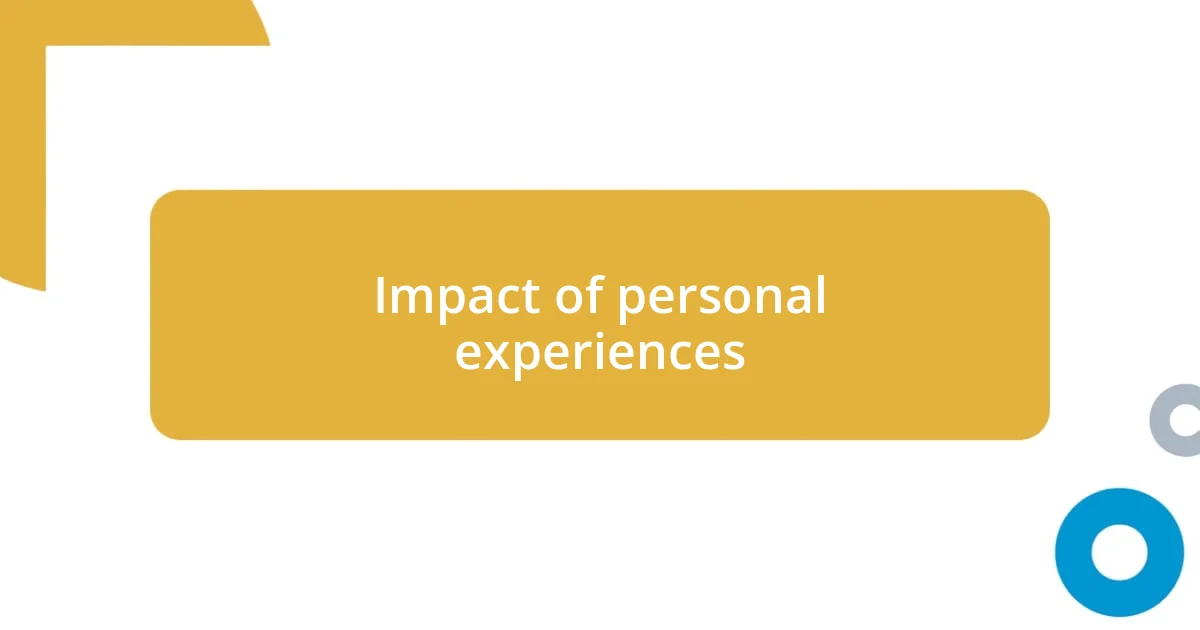
Impact of personal experiences
Personal experiences profoundly shape our understanding of cultural identity. I recall a time when I attended a workshop on traditional crafts from my community. As I watched the artisans skillfully create their works, something within me stirred. It was a reminder of my childhood spent by my grandmother’s side, learning her craft. This connection brought not just nostalgia but also a renewed appreciation for the values those skills represented—patience, creativity, and perseverance. How do pivotal experiences reshape your perspective on your own culture?
- Attending cultural workshops can reignite memories tied to personal heritage.
- Engaging in traditional crafts connects us with ancestral practices and values.
- Transformative moments often clarify our appreciation for cultural significance.
Moreover, moments of challenge often serve as unique catalysts for change. While traveling abroad, I was struck by a sense of dislocation when others questioned my cultural background. This experience forced me to confront my identity head-on; it was uncomfortable but enlightening. It ultimately led me to embrace my multifaceted heritage with pride. Have you faced similar tests that made you reassess your cultural identity?
- Experiencing cultural dislocation can compel a deeper understanding of oneself.
- Challenging interactions often encourage individuals to reclaim and celebrate their identities.
- Personal adversity can lead to growth and a more profound connection to one’s heritage.
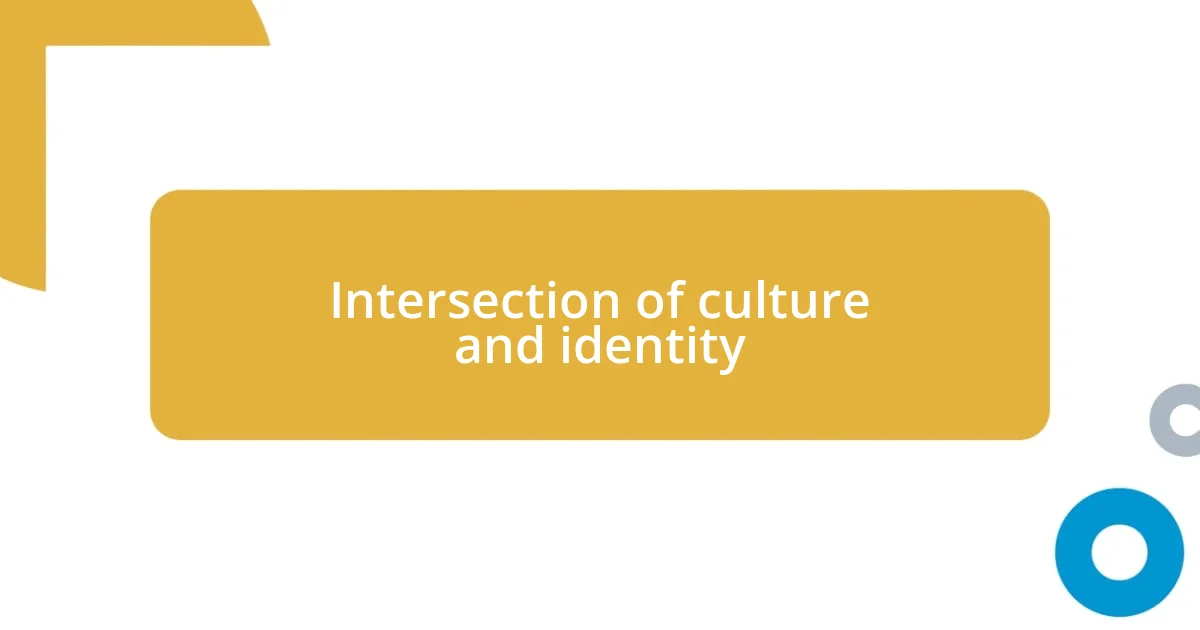
Intersection of culture and identity
The intersection of culture and identity is often a delicate dance, one that shapes who we are at our core. I remember attending a festival celebrating my cultural heritage, where the vibrant colors, sounds, and scents ignited something deep within me. It wasn’t just about enjoying the festivities; it felt like a homecoming, a reconnection to the roots that sometimes felt distant. Have you ever felt that surge of belonging when surrounded by your culture’s expressions?
Navigating multiple cultures can lead to enriching, albeit sometimes confusing, self-discovery. I often find myself blending culinary traditions—mixing family recipes with newfound ingredients from another culture I’ve embraced. This fusion represents my identity’s ever-evolving nature, illustrating how culture is not a singular path but a rich tapestry woven from diverse threads. Do you see parts of different cultures in your life that contribute to who you are today?
As I reflect on my journey, I realize that the challenges of cultural identity often foster resilience. One summer, while volunteering in a multicultural neighborhood, I faced misunderstandings rooted in cultural differences. These moments stung, yet they broadened my perspective, teaching me the importance of empathy and communication. Striving to find common ground revealed how interconnected our experiences can be. What obstacles have you overcome that deepened your understanding of your own identity?
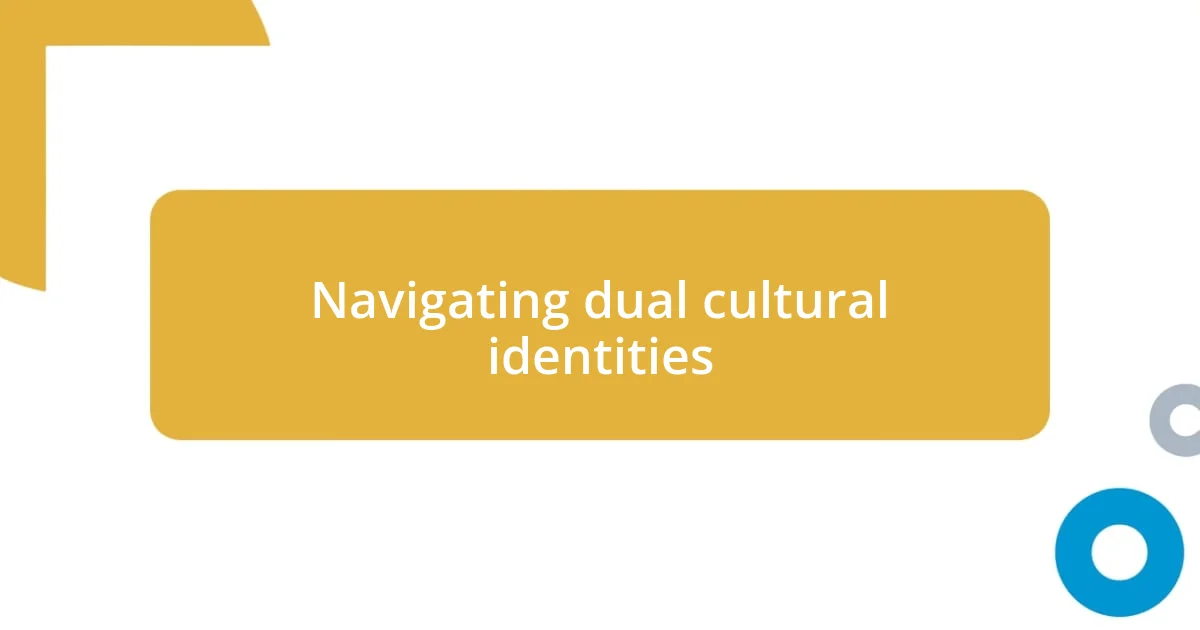
Navigating dual cultural identities
Navigating dual cultural identities often feels like a balancing act on a tightrope. I recall a family gathering where two worlds collided—my relatives speaking our ancestral language, while my friends chatted in a mix of slang and cultural references from our shared community. My heart swelled with pride at my heritage, yet I felt a twinge of isolation because not everyone understood the nuances. Have you ever experienced that duality, wanting to embrace both sides yet feeling pulled in different directions?
There are times when the oscillation between cultures brings joy, especially during shared meals. I remember cooking a fusion dish that combined my grandmother’s traditional recipes with flavors from my friend’s cultural background. The result was a delightful explosion of tastes that mirrored my own identity—it was both familiar and refreshingly new. Cooking together not only allowed us to bond, but it also taught me the beauty of merging traditions. Have you explored how blending cultures can lead to delightful discoveries?
However, the challenge sometimes comes when expectations clash. I often grapple with assumptions from others about which culture I should align with, which can feel suffocating. A particularly poignant moment occurred when I attended a seminar and was expected to represent my entire culture in a single discussion. It was overwhelming, and I realized that no one could speak for the entirety of a culture’s richness. How do you cope with those who want to define you by a single narrative? Balancing these identities invites a deep exploration of self, and through those intricacies, I’ve learned to appreciate the complexity of who I am.
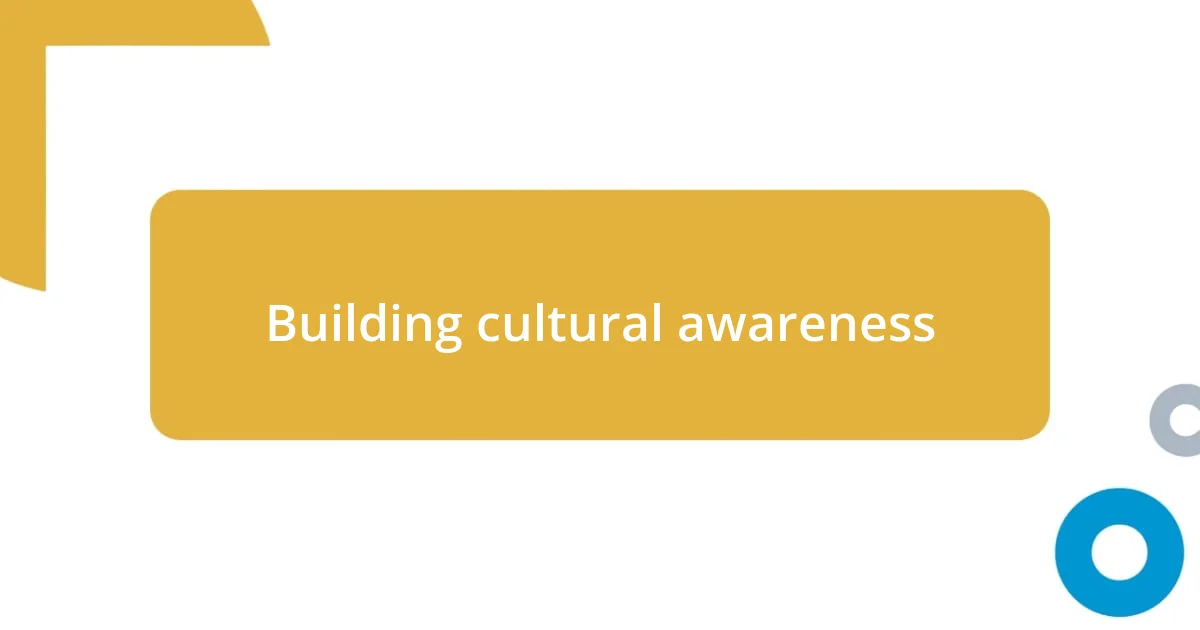
Building cultural awareness
Building cultural awareness is a journey that brings us closer to understanding not just ourselves, but the communities around us. I remember breaking the ice with a co-worker during a lunch break, where we shared childhood tales rooted in our cultural traditions. That simple exchange opened my eyes to the richness of her experiences, allowing us to appreciate our differences and similarities. Can you recall a moment when sharing your story helped bridge a cultural gap?
Participating in local cultural events has also been a powerful way for me to learn and grow. One poignant instance was attending a storytelling night showcasing narratives from various backgrounds. Listening to others express their tales echoed my own struggles and triumphs in a way that felt deeply validating. It made me appreciate the beauty of diverse perspectives. Have you ever found your own story reflected in someone else’s?
Through these experiences, I’ve come to see cultural awareness as a continuous, evolving dialogue. I often engage in reading literature that challenges my worldview, inviting me to see life through another’s eyes. This practice not only expands my understanding but also ignites compassion and respect for the myriad ways people navigate their lives. What steps do you take to deepen your cultural insights?
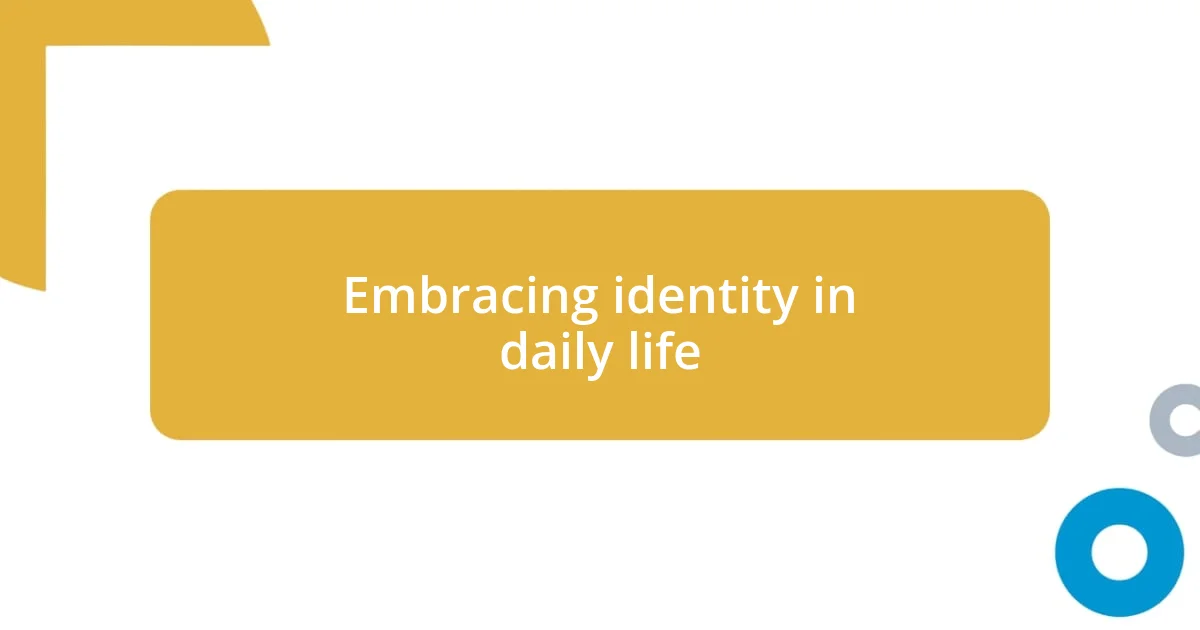
Embracing identity in daily life
Embracing my identity in daily life often means interweaving my cultural heritage into routine activities. For instance, wearing traditional clothing on special occasions isn’t just about honoring my roots; it feels like a celebration of who I am. I recall one weekend proudly donning a vibrant outfit at a community festival. It sparked conversations with strangers who approached me, eager to share their own cultural experiences. Have you ever worn something that felt like a badge of pride for your identity?
Daily rituals also serve as a grounding practice in embracing my identity. I make it a point to prepare my morning coffee with spices that reflect my cultural background, turning a simple act into a flavorful reminder of my heritage. Each sip transports me to my childhood, filled with memories of family gatherings and warmth. Isn’t it fascinating how small moments can evoke such powerful feelings?
Moreover, I find that integrating my identity into conversations can foster deeper connections. When discussing a current event, I like to relate it to my cultural perspective. I remember sharing insights about a local issue during a team meeting, where I highlighted how it resonated with my upbringing. This practice not only allows me to express my viewpoint but also encourages others to reflect on their own backgrounds. Have you ever felt the weight of your story enriching a conversation? Embracing these everyday interactions can significantly enhance how we perceive ourselves and the world around us.


